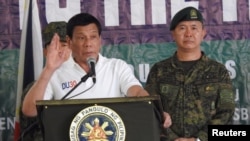Philippine President Rodrigo Duterte has long stirred criticism overseas for letting police shoot to kill on drug raids. He did it again when pushing the United States, an old ally, away in favor of closer China relations and again when he declared martial law in his country’s southland to battle a Muslim rebel group.
But after a year in office, the tough-talking 72-year-old former mayor of the Southeast Asian archipelago’s second largest city is riding a popularity wave because a lot of his own citizens like him for getting things done.
Getting things done
“My suspicion is he will retain his level of popularity for a longer period of time than the other administrations as long he’s seen as actually accomplishing something,” said Herman Kraft, political scientist at University of the Philippines Diliman.
Duterte’s government has the satisfaction of 75 percent of Filipinos, Metro Manila-based research institution Social Weather Stations said in April. Of the past five Philippine presidents, only Duterte’s immediate processor, Benigno Aquino received comparable marks.
Battle deaths in the south
An attack by government troops on the city of Marawi May 23 to stop a Muslim rebel group has not dented Duterte’s popularity. The rebels known as the Maute Group declare allegiance to Islamic State and they were believed to be planning terrorist acts. The public believes the government was justified in its attack, Kraft said. Fighting in Marawi killed nearly 400 people, mostly militants.
Duterte fanned worries from overseas about human rights violations when he declared martial law on Marawi's surrounding island Mindanao, a long-time source of sporadic violence by some of the 20 Muslim rebel groups. He declared martial law in May to add road checkpoints and allow smoother police-military coordination against the Maute Group.
In Manila, 15 of 23 senators backed martial law last month.
Anti-drug campaign
A net 66 percent of people were satisfied with the Philippine anti-drug campaign -- another hallmark of Duterte's first year -- as of March, the research group Social Weather Stations said.
Police crackdowns on illegal drugs such as the “shabu” derivative of methamphetamine have left about 7,000 dead due to extrajudicial killings, the New York-based advocacy group Human Rights Watch says.
Human rights concerns from other countries
Advocacy groups as well as leaders from Europe, the United States and the United Nations have questioned the killings, enraging Duterte. Filipinos, though the survey, says they prefer drug suspects be captured alive, but often report feeling safer over the past year than before due to stepped up policing.
“Filipinos are very happy he’s cleaning the country up,” said Al Domingo, 28, who works at an Internet startup in Manila. “It doesn’t matter if you’re a governor or if you’re a mayor. If you’re a criminal and doing something bad, you will be put in jail.”
“I will be honest I used to break the law. I’d be driving and at a red light and there were no cars, so you know.” Domingo said. “But if you want change you have to start with yourself."
Distrust of China persists
Duterte inspired debate on and offshore with his shift last year from decades of military reliance on former colonizer the United States to a stronger friendship with China. The notoriously coarse-spoken president asked the United States to cut back military aid and in October he got a pledge from Washington’s rival Beijing for $24 billion in aid and investment.
The survey firm Pulse Asia said in May that 63 percent of Filipinos distrust China, while 79 percent trust the United States.
Foreign policy is a backburner issue for Filipinos today and doesn’t hamper Duterte’s overall ratings, said Jay Batongbacal, director of the Institute for Maritime Affairs and Law of the Sea at the University of the Philippines in Metro Manila.
“Trust ratings of China are still the lowest, and the highest is still with the U.S., so that shows you that there’s a disconnect between his personal attitudes toward other countries and the general population,” Batongbacal said.
“With respect to China especially, there’s still a lot of discomfort about how he’s dealing with China on the West Philippine Sea issue,” he said. “Now since Philippine sea issues have quieted down, there’s not much public discussion of it right now.”
Big money from China
Some Filipinos have welcomed the Chinese development aid as Duterte plans to build $167 billion in infrastructure through the end of his term in 2022. New highways and railways and other projects would catalyze the development of agriculture, manufacturing and tourism, said Jonathan Ravelas, chief market strategist with Banco de Oro UniBank in Metro Manila.
“This is where you get to see a lot of enthusiasm from investors,” Ravelas said. Consumer confidence is at a record high, he added. Now the Philippines has a chance of pacing Thailand, where new projects lured factories and tourists, he said.
“We’re really playing a catch-up game,” he said. We’re using partners, not only Japan ODAs (Official Development Assistance) but even China to be able to spearhead this infrastructure spending.”
Chinese aid may help fund a $3.96 billion railway from Manila to the southeast of Luzon Island as well as a $4.3 billion railway in Mindanao, Philippine media reports say.







